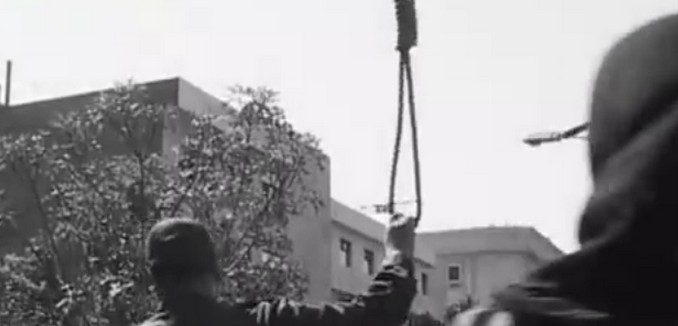Despite proclamations that the nuclear deal with the P5+1 powers represents “a turning point for Iran,” Hamid Yazdan Panah, a lawyer and human rights activist, wrote that “the facts on the ground” show an increased rate of executions in the Islamic Republic, in a commentary published by Reuters today.
Since the election of President Hassan Rouhani in 2013, all talk of the opposition movement and human rights has been swept under the rug while human rights reports from inside the country confirm the true nature of this regime. Earlier this year a report by UN Special Rapporteur on Human Rights Ahmad Shaheed noted that “the overall situation has worsened” with respect to human rights.
Just weeks after signing the “historic” deal and more than eight months after signing an interim agreement, Iran is in the midst of what Amnesty International has referred to as an “unprecedented spike” in executions. Currently, Iran’s new “moderate” administration is on pace to hit a new 12-year high in executions. And Amnesty International has noted that while the regime officially claims that only 246 executions have taken place in 2015, this number is closer to 700 in reality.
Panah wrote that, in addition to the increasing number of executions, Iran’s judicial system is highly politicized and “executions … occur with little or no due process.” Sometimes prisoners are sentenced to death in proceedings that take a few minutes.
Additionally, the United Nations and some European countries give financial support to Iran’s corrupt judicial system.
The United Nations Office on Drugs and Crime has given more than $15 million to Iran since 1998 in order to fight the “war on drugs” and most of this money comes from European nations, despite their own opposition to the death penalty. Maya Foa, director of the death penalty team for the human rights NGO Reprieve has called for a change to this policy, stating, “Even as Iran’s execution rate skyrockets, European nations like France and Germany continue to fund brutal raids by the Iranian police which routinely send people to death row for non-violent offenses.
Panah concluded by lamenting that the nuclear deal not only lacks an identified mechanism for improving human rights, but that it has also eased existing international pressure on Tehran, leaving Iranian dissidents marginalized as “the world continues to avert its eyes from Iran’s policy of death.”
Last week, 53 Iranian dissidents signed a letter stating that the billions Iran will receive due to sanctions relief will go into “the bank account of our tyrants and theocrats,” and will “enrich a repressive regime.”
Saeed Ghasseminejad, a former political prisoner in Iran and current associate fellow at the Foundation for Defense of Democracies, wrote yesterday that “Tehran has moderated its policies only under pressure; resuming its aggression when that pressure is relieved.”
In Should the U.S. Take Iran’s Human Rights Problem More Seriously?, which was published in the April 2015 issue of The Tower Magazine, senior editor Ben Cohen argued that, like North Korea, once Iran obtains or develops nuclear weapons it will be even less receptive to changing its abysmal human rights record.
The contention that success in the nuclear negotiations will organically lead to progress in areas like human rights is therefore rather suspect. Consider, by way of example, the following episode:
In February 2014, a United Nations panel of experts issued a searing report on human rights abuses in North Korea, recommending that the “Security Council…refer the situation in the Democratic People’s Republic of Korea to the International Criminal Court for action in accordance with that court’s jurisdiction.” Bitterly stung by the report, the North Koreans embarked on a round of furious diplomacy to prevent this and other recommendations from being adopted. By November, however, their efforts had been rebuffed, with the UN General Assembly committee that oversees human rights voting 111-19, with 55 abstentions, in favor of an ICC prosecution against the North Korean leadership.
On November 20, two days after the resolution was adopted, North Korea threatened to carry out a nuclear test for the first time since 2013, asserting that its “war deterrence capabilities” would be strengthened “to guard against forceful American invasion plots.” No test was carried out, because there was no need for one. It was sufficient for North Korea to remind the world that its nuclear arsenal—whose very existence violates the “Agreed Framework” deal negotiated with the U.S. in 1994—will be launched if, to quote North Korea’s ambassador in London, “a sparkle of a fire is made on the Korean peninsula.”
It seems, then, that ownership of weapons of mass destruction does not make authoritarian and totalitarian regimes improve their behavior. Nor does it make them more amenable to international incentives to do so, especially when it comes to the most important issue—their human rights records. To the contrary, as North Korea demonstrates, it makes them far less inclined to compromise, and boosts their confidence in the use of violence to suppress domestic opponents. Moreover, since Pyongyang has accused Marzuki Darusman, the UN’s independent expert on human rights violations in that country, of misusing “human right issues as a means to dismantle or overthrow the country’s system,” it is reasonable to conclude that an initiative like an ICC prosecution would be regarded by the Kim regime as precisely that “sparkle of fire” that could trigger nuclear war.
[Photo: ——– IranVNC.com ——– Iran Visual News Corps / YouTube ]




